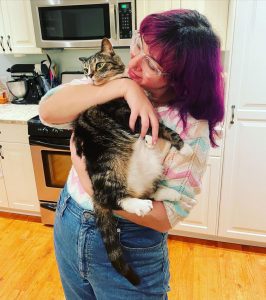During Disability Employment Month, we recognize inclusive employers and the important contribution people with disabilities make in the workplace. But what about those who forge their own path to employment?
Starting a small business comes with its own set of unique challenges and rewards. It takes a lot of planning and hard work. It will probably require learning some new skills, like marketing and managing finance. However, there are advantages, like setting your own hours and personalizing your work environment.
Local artist Margaux Wosk recently hit a milestone with their shop Retrophiliac—1000 sales on Etsy. This week, Margaux shares their experience with us as an autistic small business owner. Read on to learn more about their work, the impact of their business on their life, and how they encourage other autistic creators.
Retrophiliac Art
Running a shop as a disabled small business owner is no easy feat. Securing funding, filling out forms, working with manufacturers and learning how to import products are things I’ve had to learn as I go.
However, it’s all worth it in the end. I’ve been able to break down barriers, and I no longer have to rely on employers to sustain myself. I’ve created an environment that fosters my creativity and alleviates stress, and I am able to be my own boss.
Being able to secure funding through grants has helped me immensely. My shop, Retrophiliac, has a wide variety of items, from pins, patches and stickers that celebrate neurodiversity and Autistic pride to other items with a bright and fun aura to them.
I have helped to encourage others to create by setting up the Made by Autistics Marketplace and Made by Autistics Community on Facebook. One group is for selling art and merchandise, and one is simply for sharing—think of it as an online gallery.
For folks interested in starting their own business, I would tell them to think outside the box. It can be challenging to find assistance unless you’re looking to get a loan. If working on art is your thing and you want to monetize it, check provincially and municipally for artist grants.

Because I’ve been able to get my shop to where it is today (over 1,000 sales & counting), I have been able to do a lot of good things with it. I have retailers that carry my stock, I donate my works to various cat charities, I help other people achieve similar goals and dreams, and I have displayed my original pieces in galleries and restaurants. I’m most proud of my sales goals, my ability to sustain myself, securing my retailers, selling art to some well-known figures, and being able to publicly speak about my art and my disability activism. I also create TikToks showcasing my journey when it comes to my art, and I encourage others to think bigger and realize the impact that your art can have.
I donate cat-related artwork and merchandise to local charities for their fundraising campaigns. I would love to do a specific pin where I donate all of them to different cat charities so they can sell them and keep 100% of the proceeds. That’s where my heart is.
I utilize my art to bridge the gap between what Autistic people are capable of and the many different misconceptions of what I’m unable to do, to create a dialogue. Sometimes it just starts with someone noticing me wearing one of my pins, and it goes from there.
It’s frustrating that some of the misconceptions I’ve faced have to do with people underestimating my capabilities when it comes to entrepreneurship. I would love to have more credibility when it comes to discussing increasing funding or creating new resources for entrepreneurs, instead of being kept out of the narrative.
Making a transformative impact doesn’t have to be something that is boisterous, it can truly be something subtle. You never know what positive, creative thing is just around the corner.
– Margaux Wosk
![]()
![]()
![]() Margaux Wosk is an autistic artist and small business owner in BC. You can find their art in their Etsy shop, Retrophiliac and keep up with their blog at www.navigatingjourney.com. Margaux also recently spoke to Gloria Macarenko on CBC radio about the needs of small business owners with disabilities. You can listen to that interview here.
Margaux Wosk is an autistic artist and small business owner in BC. You can find their art in their Etsy shop, Retrophiliac and keep up with their blog at www.navigatingjourney.com. Margaux also recently spoke to Gloria Macarenko on CBC radio about the needs of small business owners with disabilities. You can listen to that interview here.














1 thought on “Disability Entrepreneurship: Margaux Wosk & Retrophiliac Art”